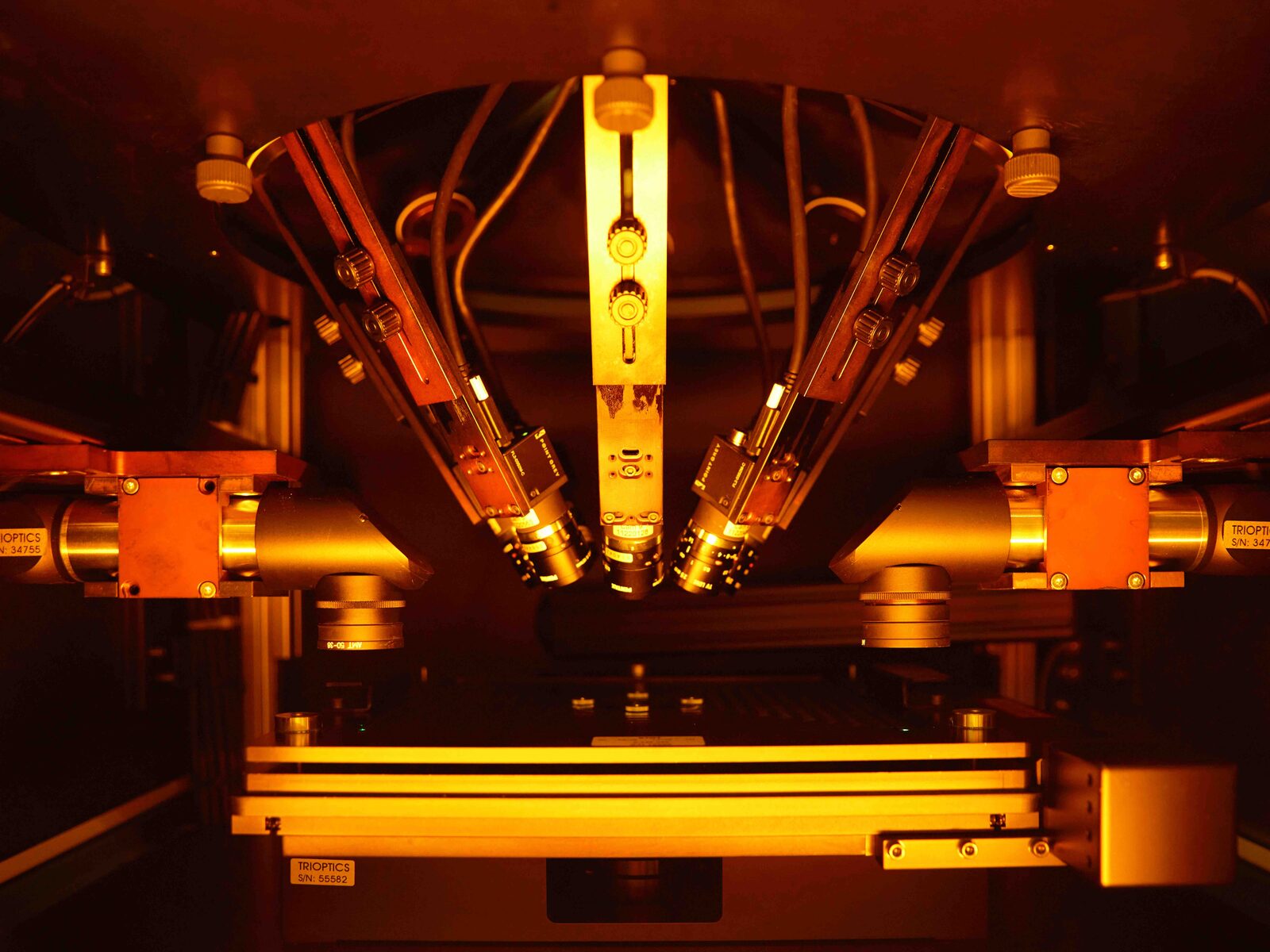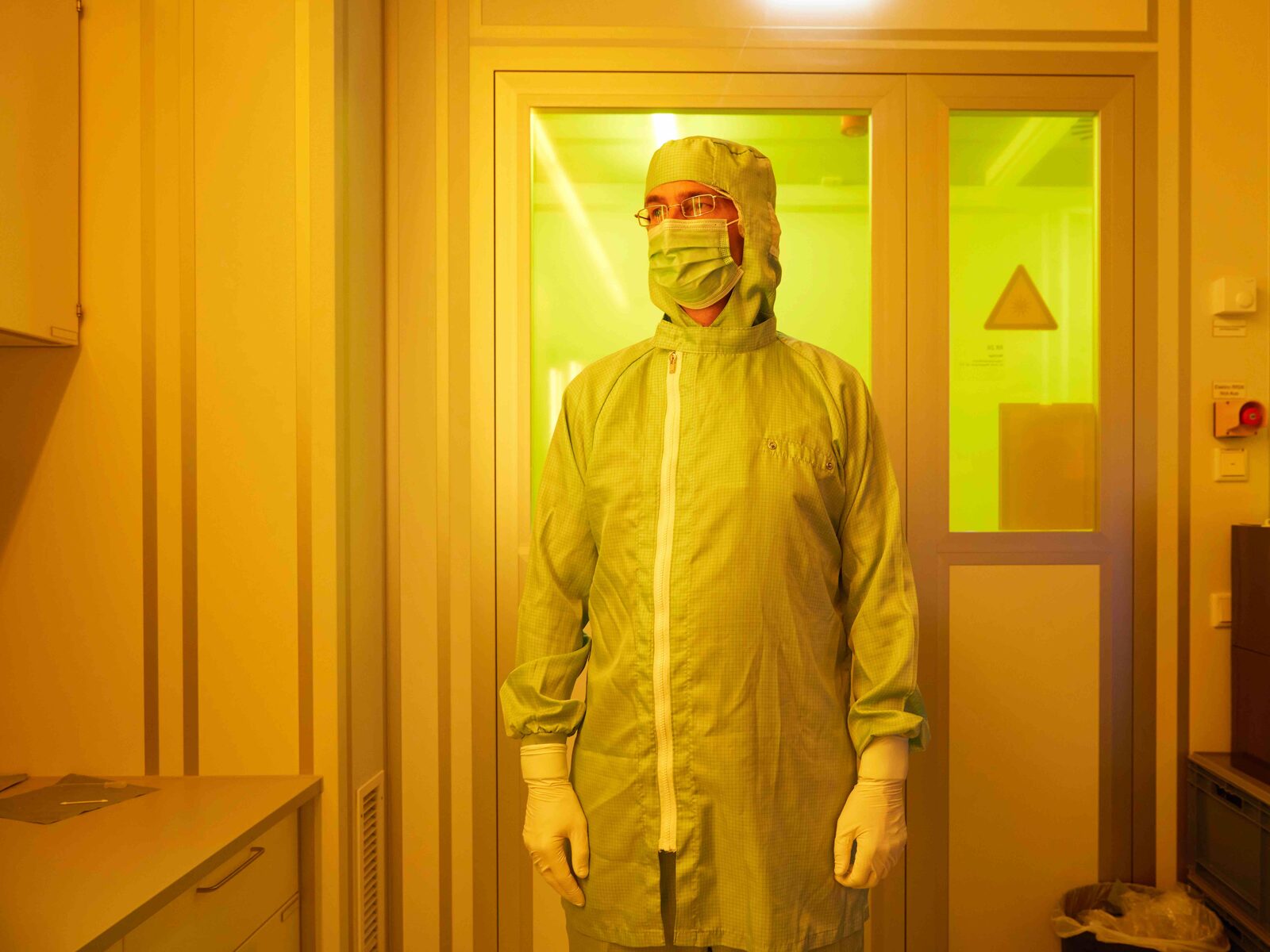Small lenses, big impact
modern camera design wants to bring high-volume production of small imaging optics back to Europe






This is the spirit of SPRIND: The two micro-optics specialists Frank Wippermann and Jacques Duparré of mcd - modern camera designs GmbH in Jena are not only launching their own breakthrough innovation, but are also paving the way for tomorrow's. With their innovation, they are revolutionizing the manufacturing process for miniaturized imaging optics in a groundbreaking new way.
That there is still substantial room for improvement in this process is evidenced by the two currently prevailing processes for the production of microlenses: "Injection molding enables the necessary high quality, but its disadvantage is that the process is very expensive for small quantities and can only be parallelized to a limited extent," explains Frank Wippermann, who has dedicated himself to the miniaturization of cameras. "Wafer-level optics, on the other hand, which has its origin in semiconductor manufacturing, can be utilized for sensor technology, but not for high-resolution camera lenses. Yet it offers the advantage of producing high volumes in an energy and cost-efficient way - since it is a highly parallelized process."
That there is still substantial room for improvement in this process is evidenced by the two currently prevailing processes for the production of microlenses: "Injection molding enables the necessary high quality, but its disadvantage is that the process is very expensive for small quantities and can only be parallelized to a limited extent," explains Frank Wippermann, who has dedicated himself to the miniaturization of cameras. "Wafer-level optics, on the other hand, which has its origin in semiconductor manufacturing, can be utilized for sensor technology, but not for high-resolution camera lenses. Yet it offers the advantage of producing high volumes in an energy and cost-efficient way - since it is a highly parallelized process."
The market for small imaging optics which is currently dominated by manufacturers in the Far East, is huge: multiple lenses are used in cameras for endoscopy, cars, PCs, tablets and smartphones. Multiple cameras can be found in each single product, up to five in a smartphone, and even up to 16 in a single car. "It's an art to get the optics to work smoothly with perfect and consistent quality at a good price," knows Frank Wippermann, who studied and holds a doctorate in physical engineering - and wants to make the seemingly impossible possible: The four-member mcd team has found a way to eliminate the disadvantages of both processes and merge their advantages. This leads to new capabilities in lens development and simultaneously saves production capacities, space, money and enormous amounts of energy.
The whole endeavour is also attractive because it lays new foundations for other innovators in the field of optics: At the beginning of great visions, there are often small quantities - these are currently extremely expensive and therefore represent a major obstacle. "The low entry costs associated with manufacturing lenses with our process, even in very small quantities, allows for easier and efficient testing of new ideas," reports physicist Jacques Duparré, whose hobby is bionics and the understanding of how insect vision principles can be advantageously transferred to the world of digital imaging.
The whole endeavour is also attractive because it lays new foundations for other innovators in the field of optics: At the beginning of great visions, there are often small quantities - these are currently extremely expensive and therefore represent a major obstacle. "The low entry costs associated with manufacturing lenses with our process, even in very small quantities, allows for easier and efficient testing of new ideas," reports physicist Jacques Duparré, whose hobby is bionics and the understanding of how insect vision principles can be advantageously transferred to the world of digital imaging.
"Our method is based on replication. Everyone knows this from the sandbox: you could say we build the perfect molds and use them to create the most beautiful and uniform sand figures."

The founders are particularly proud of the energy savings achieved. In the conventional injection molding process, polymers are melted at high temperatures, injected into the mold under high pressure, and then cooled. This requires a lot of machinery, huge plants operating under clean room conditions. "By converting the process to room temperature, increasing the degree of parallelization and using fewer machines, we can lower the energy consumption to five percent," Frank Wippermann says ambitiously. To achieve this, the founders are relying on UV-replication technology that allows thousands of aspherical, monolithic polymer lenses to be produced simultaneously in a single step. Such lenses are, for example, needed for high-end smartphone lenses.
The fact that mcd is based in Jena is of course no coincidence: "Jena is one of the top addresses for optics in Germany or even worldwide - and we have always been professionally connected since our graduate studies some 25 years ago in the same Jena company," explains Duparré, who in between worked for a start-up in Silicon Valley for seven years. He and Wippermann were and are also employed at the Fraunhofer Institute for Applied Optics and Precision Engineering IOF, where they are developing ideas for cameras that no longer protrude from the back of smartphones. When they founded their EXIST-funded company in 2019, they initially only planned to design and build prototypes and small series for miniature cameras, such as for disposable medical endoscopes. Because that worked surprisingly well and engendered great feedback from customers, the two decided to "simply" continue - and are now thinking big.
The fact that mcd is based in Jena is of course no coincidence: "Jena is one of the top addresses for optics in Germany or even worldwide - and we have always been professionally connected since our graduate studies some 25 years ago in the same Jena company," explains Duparré, who in between worked for a start-up in Silicon Valley for seven years. He and Wippermann were and are also employed at the Fraunhofer Institute for Applied Optics and Precision Engineering IOF, where they are developing ideas for cameras that no longer protrude from the back of smartphones. When they founded their EXIST-funded company in 2019, they initially only planned to design and build prototypes and small series for miniature cameras, such as for disposable medical endoscopes. Because that worked surprisingly well and engendered great feedback from customers, the two decided to "simply" continue - and are now thinking big.

With SPRIND, the two founders and their team now want to expand production "until we can produce several hundred lenses at a time - with ever greater complexity and lower tolerances," says Wippermann, describing the next targeted milestone. In January 2023, the SPRIND subsidiary FabuLens was founded for this purpose; together, the project is to pick up speed even faster.
Three lens layers are sufficient for single-use endoscopy and automotive applications and the company can already produce "aspherical menisci with a large sag-height," superlatives in microlens manufacturing. The goal of the ambitious founders: "We see lenses for cameras in smartphones as the main application. These have up to seven lenses with the highest quality requirements - and that's where we want to go."
More about modern camera designs: www.m-c-d.eu
Three lens layers are sufficient for single-use endoscopy and automotive applications and the company can already produce "aspherical menisci with a large sag-height," superlatives in microlens manufacturing. The goal of the ambitious founders: "We see lenses for cameras in smartphones as the main application. These have up to seven lenses with the highest quality requirements - and that's where we want to go."
More about modern camera designs: www.m-c-d.eu
Their vision is to bring high-volume production of miniature and microlenses back to Europe and Germany.

SPRIND AND MODERN CAMERA DESIGNS
WHY WE ARE COMMITTED
Because we are driving an industry revolution with mcd production technology.
Because with this technology we have a production technology that addresses all applications for miniature and micro lenses.
Because this production technology overcomes existing limitations and lays new foundations for imaging innovations.
WHAT WE DO
We challenge the market leadership of Asian manufacturers in the production of high volume optics, specifically in the area of precision optical injection molding.
To provide developers with the space and resources to research the high quality requirements of smartphone cameras and further develop production technology.
PROMOTING EUROPEAN SOVEREIGNTY
Through this production technology, we will return a key technological capability to Germany, thus promoting Germany as a key player in innovation.
NETWORKING AND THINKING BIGGER
SPRIND supports mcd with its extensive expert network and contacts to business partners and early adopters in order to advance the potential of the project in the fastest possible way and to translate the technology into application.
Because we are driving an industry revolution with mcd production technology.
Because with this technology we have a production technology that addresses all applications for miniature and micro lenses.
Because this production technology overcomes existing limitations and lays new foundations for imaging innovations.
WHAT WE DO
We challenge the market leadership of Asian manufacturers in the production of high volume optics, specifically in the area of precision optical injection molding.
To provide developers with the space and resources to research the high quality requirements of smartphone cameras and further develop production technology.
PROMOTING EUROPEAN SOVEREIGNTY
Through this production technology, we will return a key technological capability to Germany, thus promoting Germany as a key player in innovation.
NETWORKING AND THINKING BIGGER
SPRIND supports mcd with its extensive expert network and contacts to business partners and early adopters in order to advance the potential of the project in the fastest possible way and to translate the technology into application.
SPRIND Podcast
Thomas Ramge spricht mit
Menschen, die Neues neu denken.
Menschen, die Neues neu denken.
#67 Frank Wippermann (20. 11. 2023)
32:05